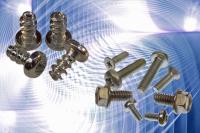 Add My Company
Add My Company
Sign In

Challenge Europe are delighted to hold in stock both metal thread-forming screws, e.g. for castings etc where they secure components by forming a machine thread – also purpose designed screws for thread forming in plastics.
The Challenge Europe team point out that thread forming tri-lobular screws are used for fixing into metal components – a form of self-tapping screw, they use the tougher tri-lobular design which assists the grain flow as it effectively deforms a thread into thicker material than could be managed with a standard self-tapping screw. This process results in a thread geometry that is more accurate than a standard self-tapper and so provides a stronger fixing which is more resistant to loosening under vibration. Almost a machine screw in concept these thread forming screws leave a tapped hole when removed and may be replaced with a standard rolled thread machine screw if required – for example at servicing or repair and thereby provide a much higher torque loading capacity than a standard self-tapping thread. They are typically used in steel, aluminium, aluminium die castings, zinc die castings, magnesium and other light alloys.
Heads and drives include countersunk, pan, and hexagonal/flange types with cross recess, multi-splined (star) or hexagonal formats. Hardened steel is normal for most applications and is suitable for use in a variety of metals providing the correct diameter pilot holes are in situ. Stainless steel thread forming screws are also freely available but tend to be used in softer materials such as aluminium and zinc.
Thread forming screws for plastics have become more and more important in the assembly of everything from electronic equipment to furniture, as they are easily inserted into drilled or moulded holes in thermoplastic materials where they deform the material to provide optimum fastening force superior to standard self-tappers. Thread forming screws are especially useful in the manufacturing production environment where an automatic feed can be employed to greatly speed the assembly process, by eliminating the need for nuts or inserts, so reducing piece part costs, labour costs and process costs.
There are a range of thread geometries associated with this type of screw, this is to allow for their use with different component materials and design features. For example, if required for insertion into thinner walled, harder plastic mouldings it might be advisable to try a tri-lobular thread variant which tends to reduce the risk of burst out. Of course, the choice of hole diameter can be critical and the team at Challenge can advise on both screw selection and suitable hole diameters.
Head formats for use with plastics include countersunk, pan, and flange types with cross recess or multi-splined (star) drives. Typical materials include hardened steel with a zinc & clear passivate finish or in some instances black finishes can be available, also stainless steel. Again, proper installation requires a pre-formed hole of the right diameter to properly form or cut the right size thread and to take advantage of the benefits of this design which include low radial stress, no material to jam the thread, maximum resistance to substrate relaxation and no material stress through plastification.
For more information on The Challenge Europe difference between Thread-forming screws and Self-tappers talk to Challenge (Europe) Ltd
Enquire Now
More News
List your company on FindTheNeedle.

